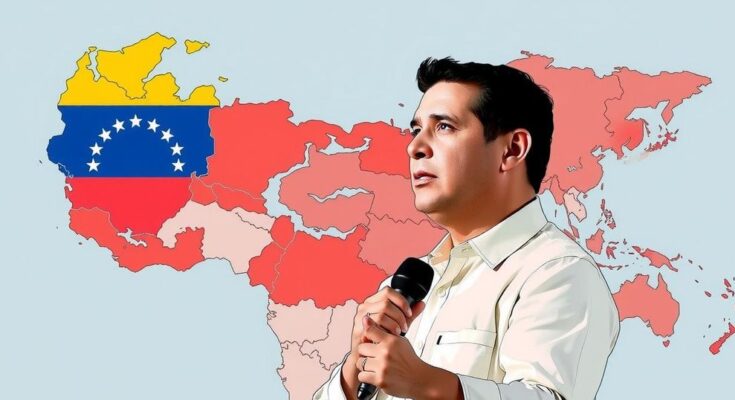Nicolás Maduro was sworn in for a third presidential term in Venezuela amid allegations of electoral fraud. The opposition, led by Edmundo González, claims a legitimate victory. Latin American leaders have united against Maduro, calling his government a dictatorship, while experts urge the U.S. to recalibrate sanctions to support democracy without harming the Venezuelan populace.
On January 5, 2025, Nicolás Maduro was ceremoniously sworn in for a third term as President of Venezuela, despite widespread allegations of electoral fraud during the July 2024 elections. The opposition claimed their candidate, Edmundo González, received more votes than Maduro, raising questions about the legitimacy of Maduro’s claim to power. The situation is further complicated by an oppressive regime that has attempted to silence dissent, notably through the temporary detention of opposition leader María Corina Machado. Despite these challenges, leaders across Latin America unanimously denounced Maduro’s power grab, indicating a rare consensus on the matter.
Experts from the Atlantic Council have weighed in on the implications of this political turmoil for Venezuela’s future. Jason Marczak pointed out that Latin American governments, regardless of their political affiliations, are coming together in their opposition to Maduro, with a unified focus on supporting democratic values and the opposition. Geoff Ramsey highlighted the internal tensions within the Maduro regime as it continues to exert control, suggesting that the next U.S. administration should leverage these dynamics to promote a democratic transition.
Despite sanctions imposed by the Biden administration, which included increasing rewards for Maduro and his officials, Iria Puyosa argued that these measures remain inadequate for effectively removing Maduro from power. She emphasized the importance of timely and decisive actions to support the Venezuelan opposition, who are increasingly mobilizing against the regime. Lucie Kneip underscored the necessity for the opposition to organize around a cohesive strategy in light of internal divisions and the looming 2025 elections.
Moreover, William Tobin stressed the importance of recalibrating U.S. sanctions targeted at both the oil sector and individuals within Maduro’s regime. He noted that while Venezuelan oil production has seen a marginal recovery, it is essential that sanctions do not inadvertently empower Maduro’s financial networks. The focus should be on balancing pressures to maintain democratic prospects in Venezuela while avoiding economic burdens on its people.
In conclusion, Maduro’s re-assumption of power amidst allegations of electoral fraud has fostered a collective rejection from Latin American leaders, creating a potential shift in regional politics. With the opposition’s resurgence and international focus on Venezuela’s democracy, future developments will hinge on coordinating strategies that support political change while minimizing harm to the citizenry.
Venezuela has faced severe political and economic crises, particularly following the controversial presidency of Nicolás Maduro, who has been accused of undermining democracy and perpetrating human rights violations. The July 2024 elections, which resulted in a disputed victory for Maduro, have contributed to rising tensions within the country. The atmosphere of dissent against Maduro has led to significant international scrutiny and calls for decisive action to restore democratic governance in Venezuela, especially from regional leaders in Latin America and the new U.S. administration.
The overarching sentiment among experts is clear: Maduro’s third term is not legitimate, and the unity displayed by Latin American leaders against his regime signals a pivotal moment for Venezuela. The call for coordinated international strategies to bolster the opposition could pave the way for a significant political transition. However, careful management of sanctions and support for democratic initiatives will be crucial in the coming months to avoid exacerbating the already dire humanitarian situation.
Original Source: www.atlanticcouncil.org




